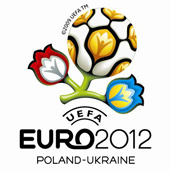
 Poland and Ukraine today won the bid to host the UEFA EURO 2012 Soccer Championship. The decision by the UEFA Executive Committee came as a most welcome surprise for two nations currently mared by political crisis. Beating the odds against favourite contender Italy, UEFA in a seminal decision opted for development instead of profit. By this brave and strategic decision, UEFA clearly showed that soccer is a concern for all or Europe, and not merely a concern of mighty nations of the EU.
Poland and Ukraine today won the bid to host the UEFA EURO 2012 Soccer Championship. The decision by the UEFA Executive Committee came as a most welcome surprise for two nations currently mared by political crisis. Beating the odds against favourite contender Italy, UEFA in a seminal decision opted for development instead of profit. By this brave and strategic decision, UEFA clearly showed that soccer is a concern for all or Europe, and not merely a concern of mighty nations of the EU.
Sport is politics. This has been evident ever since the 1933 Berlin Olympics. Who gets to host a major international sports’ event has enormous profits to gain economically and in terms of goodwill. However, it is also a big gamble, as the opposite is equally true if organisers fail to successfully go trough with the event. Then, it involves great losses in both profit and prestige for the states concerned.
Faced by such considerations, the UEFA  Executive Committee still decided for the Poland-Ukraine joint candidacy. The main contender and favourite was Italy, which already has the necessary infrastructure in terms of arenas, airports, roads, etc. However, what in the end seems to have turned the tide against Italy, are the recent bribery scandals and hooligan riots that so has tarred the image of Italian soccer internationally. This was not the case with with Poland and Ukraine, but this positive image may also prove an unwelcome blessing for Warzaw and Kiev.
Executive Committee still decided for the Poland-Ukraine joint candidacy. The main contender and favourite was Italy, which already has the necessary infrastructure in terms of arenas, airports, roads, etc. However, what in the end seems to have turned the tide against Italy, are the recent bribery scandals and hooligan riots that so has tarred the image of Italian soccer internationally. This was not the case with with Poland and Ukraine, but this positive image may also prove an unwelcome blessing for Warzaw and Kiev.
Without the necessary infrasctructure, Poland and Ukraine now face the gigantic task of forming the preconditions for a successful event, e.g. building eight new UEFA standard soccer arenas. The championship finals are intended to take place on the Kiev Olympic Stadium, which now has to undergo fundamental renovations in upcoming years. All these efforts will, of course, take enormous amounts of money, and it is exactly here the entire project may backfire on both Warzaw and Kiev. Without an extremely transparent tender process for the fat contracts to build arenas, develop infrastructure or sell Championship paraphernalia, organisers may face a constant media nightmare in founded or unfounded allegations of foul play and bribery in the process up till the 2012 UEFA Championships.
If this would become the case, two states with already politically tarred reputations, might end up with an irrepairable loss of status in European affairs. If, to the contrary, Ukraine and Poland would use the Championships as a vehicle to rid themselves of corruption and power abuse, they could both stand to win not only the laurels of sportmanship, but also the benefits of societal fair play. Consequently, the 2012 UEFA Championships may prove if Poland may fully assume its role as a major European power and if Ukraine will become a full-fledged member of the European Union family. Today, sport truly is politics, and who skilfully manages to exploit sports, will also win at politics.
If, to the contrary, Ukraine and Poland would use the Championships as a vehicle to rid themselves of corruption and power abuse, they could both stand to win not only the laurels of sportmanship, but also the benefits of societal fair play. Consequently, the 2012 UEFA Championships may prove if Poland may fully assume its role as a major European power and if Ukraine will become a full-fledged member of the European Union family. Today, sport truly is politics, and who skilfully manages to exploit sports, will also win at politics.


















